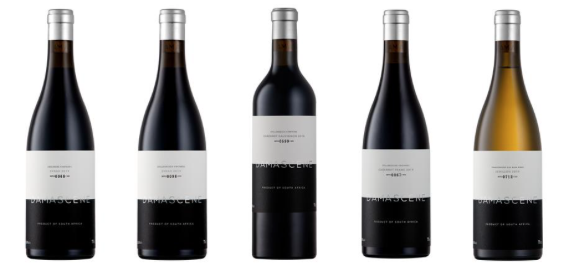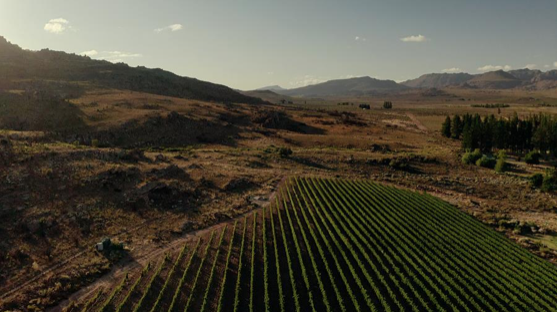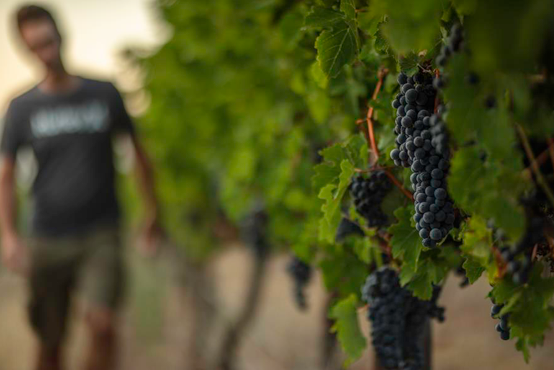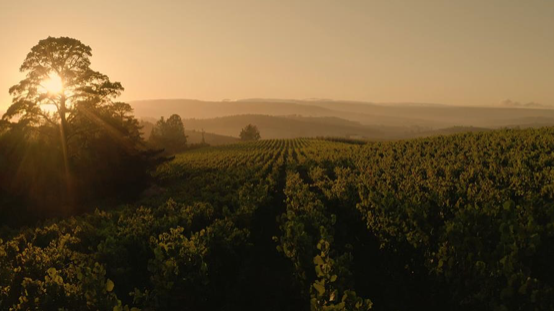The much anticipated second edition of the acclaimed Damascene Portfolio; storied riches of South Africa’s unique vineyards.
South Africa, October 2020; October 29 sees the second release of the critically acclaimed DAMASCENE portfolio, a wine range without borders, digging into the heart of South Africa’s most rare sites to deliver wines of authenticity and finesse – wines that speak of their origins.
A partnership between celebrated Cape winemaker Jean Smit and David Curl, former owner of Château Gaby in Canon-Fronsac, Bordeaux, now of Moya Meaker in Elgin, home of estate-grown pinot noir.
“We drive more than 40,000km per year, kilometres we rack up in the pursuit of discovering new sites,” shares Jean Smit, winemaker of DAMASCENE. “Sometimes, after a while, the lush green pastures disappear, even the road signage,” he muses. “You climb to nearly 1000m above-sea-level and then once you are surrounded by even higher mountains and fynbos, you stumble across some of the most unique vineyard sites in South Africa.”
One particular site he’s referring to was planted in 2006 on the oldest farm in the Cederberg, which dates back to 1790. High up on crumbling sandstone soils, the vines are rooted in the underlying ferricrete. This is extreme viticulture. The Syrah clings to the edge of the world, nothing but the heavens above – and whatever manner of climate it wants to pour down, be it wind, rain, snow, it does unheeded.
At 940-metres above-sea-level this isolated pocket benefits from a wide diurnal range, cold nights are followed by warm days resulting in balanced grapes with a natural acidity and an intensity of flavour.
“On my first visit to the farm I spotted a Cape leopard, crossing the road less than 30 metres from me.” A rare sighting that Smit took as a sign.

In the winemaking he opts for a light-handed approach. “Cederberg’s Syrah has massive intensity, you need to take your foot off the pedal in the winery to achieve a balanced wine that showcases the region.” A natural ferment is followed by maturation in 1000-litre oak foudres for 11 months. Smit prefers to bottle without fining, doing so as to strip none of the character out of the wine, to ensure an authentic expression of Syrah.
The Damascene Cederberg Syrah 2019 with lifted aromatics of dried wildflowers, confetti bush and cool slate sketch out a vision of its vineyard’s mountainous home. Brooding cassis tumbles along with fresh cut lavender, spiced with black pepper and savoury olive tapenade. Saffron witchcraft teases the edge of the senses, hinting at a place unknown, of virgin terroir. The palate is supple and lithe, packed with energy, coiled around its core of pure, intense dark fruit, driven by a piquant acidity forged in the isolation of cold nights.

Following the maxim of ‘Less Cult, More Cultivation’ Smit is currently working with 45 sites in over a dozen regions throughout the Western Cape. He says his relationships with the farmers he works with is paramount. He underscores that it is of vital importance to listen to and work with the historic stewards of the vineyards. “Each owner knows the unique conditions of their site and harnessing that knowledge helps us ensure we cultivate the vines to their ultimate potential.”
How does he find these sites? “Mostly through word-of-mouth,” says Smit. “Once the grower I’m speaking to understands what I’m looking for – soil, aspects, solar radiation and so on – they often steer me in the direction of a block on the next hillside that has exactly that. They understand that I want to show the best of South Africa to the world. They also get excited and help me to discover different pockets rather than just looking out for their own interests. There is a sense of patriotism that becomes tangible on those slopes.”
When he finds a site he wants to work with he commits whole-heartedly, rather than just buying the fruit for the season he signs a long-term contract, helping to ensure the longevity of the vineyard, in an industry where low yielding blocks, deemed unprofitable for farmers, are being grubbed up at a rapid rate.
It’s a gamble of course working like this, there has to be trust, and a certain amount of luck thrown in. “I listen to my gut as to what makes a block special. It’s important that we don’t follow trends.” Hence his decision to work with Stellenbosch sites, one of South Africa’s most historic and arguably most important viticultural regions, but certainly not new or seen as ‘trendy’. The magic lies in finding these special sites within the more commercial vineyard sprawls – and to produce something completely divergent to the rest of the region.
Smit blocked out the noise and followed his instinct, which led him to sourcing fruit from a number of vineyards here – and his debut release saw him shooting out the lights, garnering both local and international acclaim, being hailed as a ‘pitch-perfect set of wines’ and as ‘one of the most exciting South African releases in a decade’ by respected critics.
As with the inaugural release, the Damascene Stellenbosch Syrah 2019 is sourced from the Bottelary and Polkadraai Hills – each site adding a building block to the wine. The vineyard on Polkadraai Hills was planted on a southeast slope in 1996, and contributes perfume and spice to the wine. While the structure and fruit intensity comes from a vineyard of low-yielding granitic soils in the Bottelary.
Fragrant wild roses and sandalwood leads to a nose of spice and smoke, of black olive and tilled earth, of salt-baked rock. The palate is full of nuance, a shining brilliance of fruit coated with that electric minerality that fizzles in the sky after a storm. That clarity is drawn throughout, guided by silky tannins, a touch of opulence, as it finishes fine and long.

Another new wine to the portfolio is the Damascene Stellenbosch Cabernet Sauvignon 2018. The Cabernet was sourced from mature vineyards scattered across the Helderberg, Bottelary and Polkadraai Hills. Granitic outcrops, these sites produce fruit with an outstanding purity and brightness.
As with all the wines, Smit prefers a natural ferment, the point of difference with the Cabernet however is the use of new oak. Maturation takes place in a new French barriques and 1000L foudre.
Intricate yet powerful, iodine and iron filings meld with bright cranberry fruit, earthy red berries, and an incense like musk, seasoned with sweet spice from 22 months in new French oak. The fruit on the palate is precise and concentrated, tight, guarding the cassis to come. Woven tannin lies as gossamer silk, smooth but immutable, framing red plum compote that slowly reveals itself against a mineral granitic mid-palate; a refreshing acidity and moderate alcohol uplift and intensify the fruit purity and freshness on the finish.
From the cooler east-facing slopes of the Bottelary, Smit has found a treasure trove of Cabernet Franc. The trellised vineyard was planted in 2004 on soils of decomposed granite, at an altitude of 260-metres above-sea-level. Comments Smit: “This low-yielding vineyard produces small bunches that offer incredible concentration, structure and ripeness at low sugar levels.”
The Damascene Stellenbosch Cabernet Franc 2019 showcases the purity of its site. The delicacy of rosewater sails along with fresh fennel, peppered raspberry and red cherry succulence; the aromatics shifting shadows of garrigue and dark floral perfume. On entry, an exhilarating bite of sweet-and-sour wild plum, juicy blackcurrant; a purple sappiness against gravelly grape tannin, giving the lucent palate rocky depth. A lively acidity acts as a textural element too, reeling along the intensity of the structure slowly into a graceful finish.
For the old vine Semillon, Smit heads to the Franschhoek Valley.
“If you tell a story about South Africa, you have to talk about Semillon,” he says. “It’s integral to our history. The first plant material that came to South Africa in the 1600s already had Semillon with it. It was part of the first experimental block as well as the first commercial vineyards. In the late 1800s it comprised almost 95 per cent of all plantings.”
The Damascene Franschhoek Semillon 2019 is made from revered vineyards planted in 1942 and 1962 on alluvial soils of decomposed Table Mountain sandstone. A portion – approximately 15 percent – of the bush vines have naturally mutated into Semillon Gris. Both components were harvested and co-fermented.
A seashell breeze opens the interior life of the old vine Semillon, evolving in the glass, a subtle iridescence of flavour. Layers unfold; the slick of sea becomes salted caramel and just-toasted almonds, complemented with a kaleidoscope of orange citrus, apricot tang and white peach purity, then scented with the spiced perfume of ginger blossom and an undertow of savoury lanolin. The complexity deepens on the chalky palate, a stony freshness running right through, speaking of the Semillon’s riverside origins. The mineral acidity races along with the broad, textural presence of the wine, a tug between glycerol density and weightlessness, skating into a waxy orange-toned, lengthy finish.

The next chapter of this story takes place in Elgin at partner David Curl’s farm. Here there’s a 3.12-hectare parcel of pinot noir, planted on a ridge of ancient clay-rich Bokkeveld shale. It’s from this cool-climate fruit that Smit produces the Moya Meaker Pinot Noir 2019
An immaculate bombardment of red and black fruit, a joyful vibrancy of fresh cherries, the coolness of newly budded roses and subtle hits of spiced black plum and white pepper, career along gracefully and evolve onto a palate shot through with blood orange zing. Deft and lightweight, underpinned by classic black cherry and just a hint of bitter chocolate. The tannin structure is lux and coated, and bends in harmony with the lemony acidy. Supreme balance and extraordinary length lend this wine to a smart dinner companion, or chilled down just slightly as a daytime refresher.
The Elgin farm is now also home to a custom built 120-tonne cellar, where both DAMASCENE and Moya Meaker wines are made. Officially open from early 2021, intimate tastings will be available by appointment. The viticultural team here, guided by Jean are busy with soil preparation – they will be planting 3-hectares of slopes with Chardonnay in the next growing season. The aim at Moya Meaker is to focus only on cultivating Burgundian varietals, harnessing the coolness of the Elgin microclimate.
Smit says he relishes the time spent in the quiet of the car when looking for new sites, or in the solitude of a remote vineyard. “There’s just this intense sense of the natural world, of being wholly alive in the moment.”
“The thing that drives us at DAMASCENE is knowing that these wines are out there, waiting to be made. As a winemaker nothing excites me more than looking for that next DAMASCENE moment.”
“The experimental side of what we do will always be there, that’s what takes us to new vineyards, new people, new combinations of cultivar and site. We have an amazing opportunity in South Africa, we need to let these vineyards tell their stories to the rest of the world.”
#damascenevineyards #moyameakerwines
For sales and wine tasting enquiries please contact Jean Smit, jean@damascenevineyards.com or jean@moyameaker.com
For press assistance contact Ian or Lise Manley of ManleySocial on 082 828 5168, emailpremierbrands@publicity.co.za or visit ManleySocial at www.manleysocial.com